Intro
Lisinopril 10mg tablets treat hypertension, heart failure, and protect kidneys. This ACE inhibitor lowers blood pressure, reducing cardiovascular risk and stroke.
Lisinopril 10mg tablets have become a cornerstone in the management of various cardiovascular and renal conditions. The importance of understanding the uses, benefits, and potential side effects of lisinopril cannot be overstated, as it is a medication that is widely prescribed and used by millions of people worldwide. As we delve into the world of lisinopril, it becomes clear that this medication plays a vital role in improving the quality of life for individuals suffering from conditions such as high blood pressure, heart failure, and diabetic nephropathy. In this article, we will explore the uses of lisinopril 10mg tablets, their working mechanisms, and the benefits they provide to patients.
The significance of lisinopril lies in its ability to inhibit the conversion of angiotensin I to angiotensin II, a potent vasoconstrictor that can lead to increased blood pressure and cardiovascular stress. By blocking this conversion, lisinopril helps to relax blood vessels, reduce blood pressure, and decrease the workload on the heart. This, in turn, can help to reduce the risk of heart attack, stroke, and kidney damage. As we continue to explore the uses of lisinopril 10mg tablets, it becomes evident that this medication is a valuable tool in the management of various cardiovascular and renal conditions.
Lisinopril 10mg tablets are commonly used to treat conditions such as high blood pressure, heart failure, and diabetic nephropathy. They are also used to improve survival and reduce the risk of heart attack and stroke in patients with a history of cardiovascular disease. The benefits of lisinopril are numerous, and they include reducing blood pressure, decreasing the risk of cardiovascular events, and slowing the progression of kidney disease. As we examine the uses of lisinopril 10mg tablets in more detail, it becomes clear that this medication is a vital component of modern cardiovascular and renal care.
Lisinopril 10mg Tablet Benefits

How Lisinopril Works
Lisinopril works by inhibiting the conversion of angiotensin I to angiotensin II, a potent vasoconstrictor that can lead to increased blood pressure and cardiovascular stress. This is achieved through the blockade of angiotensin-converting enzyme (ACE), which is responsible for converting angiotensin I to angiotensin II. By blocking this conversion, lisinopril helps to relax blood vessels, reduce blood pressure, and decrease the workload on the heart.Lisinopril 10mg Tablet Uses in Hypertension
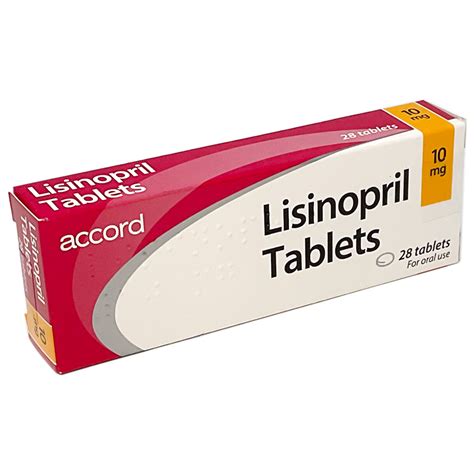
Lisinopril 10mg Tablet Dosage and Administration
The dosage and administration of lisinopril 10mg tablets vary depending on the condition being treated and the individual patient's response to the medication. The typical dosage range for lisinopril is between 2.5mg and 40mg per day, with the majority of patients requiring a dose of 10mg per day. Lisinopril can be taken with or without food, and it is recommended to take the medication at the same time each day to maintain a consistent level of the medication in the bloodstream.Lisinopril 10mg Tablet Side Effects
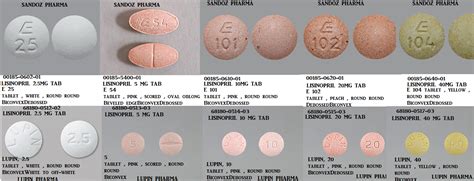
Lisinopril 10mg Tablet Interactions
Lisinopril 10mg tablets can interact with other medications, including: * Diuretics: Lisinopril can increase the risk of hypotension when taken with diuretics. * Potassium-sparing diuretics: Lisinopril can increase the risk of hyperkalemia when taken with potassium-sparing diuretics. * Nonsteroidal anti-inflammatory drugs (NSAIDs): Lisinopril can increase the risk of renal impairment when taken with NSAIDs.Lisinopril 10mg Tablet Warnings and Precautions
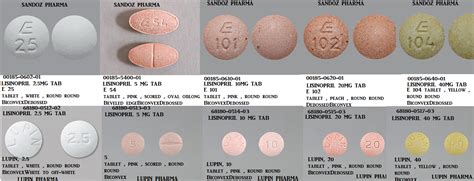
Lisinopril 10mg Tablet Overdose
In the event of an overdose, lisinopril 10mg tablets can cause severe hypotension, renal failure, and other complications. Treatment of an overdose typically involves supportive care, including administration of fluids and monitoring of vital signs.Lisinopril 10mg Tablet Contraindications
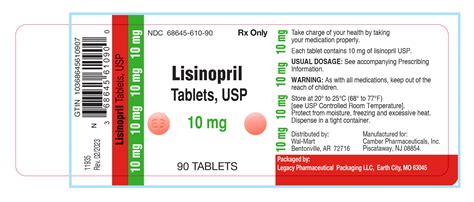
Lisinopril 10mg Tablet Storage and Handling
Lisinopril 10mg tablets should be stored at room temperature, away from light and moisture. The medication should be kept out of reach of children and pets, and it should not be disposed of in wastewater or household waste.Lisinopril 10mg Tablet Patient Counseling
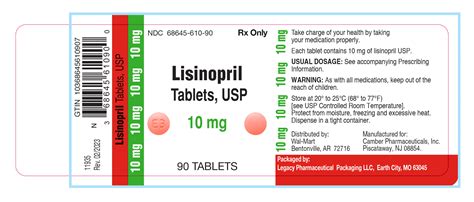
Lisinopril 10mg Tablet Clinical Trials
Lisinopril 10mg tablets have been studied in numerous clinical trials, including the SOLVD trial, which demonstrated the efficacy of lisinopril in reducing mortality and morbidity in patients with heart failure. The ATLAS trial also demonstrated the efficacy of lisinopril in reducing blood pressure and cardiovascular events in patients with hypertension.What is the typical dosage of lisinopril 10mg tablets?
+The typical dosage range for lisinopril is between 2.5mg and 40mg per day, with the majority of patients requiring a dose of 10mg per day.
What are the common side effects of lisinopril 10mg tablets?
+The most common side effects of lisinopril include cough, dizziness, headache, and fatigue.
Can lisinopril 10mg tablets be taken with other medications?
+Lisinopril can interact with other medications, including diuretics, potassium-sparing diuretics, and nonsteroidal anti-inflammatory drugs (NSAIDs). Patients should consult their healthcare provider before taking any new medications.
As we conclude our exploration of lisinopril 10mg tablets, it is clear that this medication plays a vital role in the management of various cardiovascular and renal conditions. We invite you to share your thoughts and experiences with lisinopril, and to ask any questions you may have about this important medication. Whether you are a healthcare provider or a patient, we hope that this article has provided you with a deeper understanding of the uses, benefits, and potential side effects of lisinopril 10mg tablets. By working together, we can improve the health and well-being of individuals suffering from cardiovascular and renal disease, and promote a brighter future for all.
